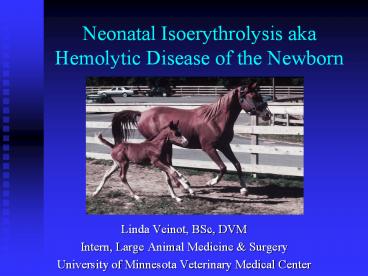Neonatal Isoerythrolysis aka Hemolytic Disease of the Newborn - PowerPoint PPT Presentation
1 / 24
Title:
Neonatal Isoerythrolysis aka Hemolytic Disease of the Newborn
Description:
Foal must ingest colostrum carrying the antibodies to its RBCs ... 3.Aa positive foal 4.foal ingests antibodies via colostrum ... – PowerPoint PPT presentation
Number of Views:967
Avg rating:3.0/5.0
Title: Neonatal Isoerythrolysis aka Hemolytic Disease of the Newborn
1
Neonatal Isoerythrolysis akaHemolytic Disease of
the Newborn
- Linda Veinot, BSc, DVM
- Intern, Large Animal Medicine Surgery
- University of Minnesota Veterinary Medical Center
2
Definition
- immune-mediated
- hemolytic disease
- maternal antibodies
- against the foals RBCs
- ingested
- destroy the RBCs
3
Equine Blood Groups
- Seven groups A,C,D,K,P,Q,U
- All have proteins that stimulate an immune
response in an animal that does not have that
blood group - A and Q are the most common
4
Blood Groups (contd)
- If a sire has a blood type
- ..the foal may inherit that type
- If the mare doesnt have that type
- ..she sees those RBCs as foreign
- and produces antibodies against them
5
What are antigens antibodies? They are both
proteins
- ANTIBODIES
- are made by lymphocytes
- are raised by our bodies
- help defend us against anything foreign
- ANTIGENS
- any substance seen as foreign
- AND can produce an immune response
6
So for NI to occur
- Blood type from sire that mare doesnt have
- Foal inherits that blood type with its antigen
- Mare has been previously sensitized to the
antigen has produced antibodies - Foal must ingest colostrum carrying the
antibodies to its RBCs
7
Soas an example
1.Aa negative mare 2.that has antibodies to
Aa 3.Aa positive foal 4.foal ingests antibodies
via colostrum 5.abs enter foals blood and
cause RBC destruction
8
But how does the mare see the antigen?Prior to
this pregnancy
- 1. Blood gets exchanged between foal and mare
during delivery. - 2. Transplacental hemorrhage may occur in late
gestation. - 3. A blood transfusion
- In any of these cases, if the blood is of a
type not carried by the mare, she makes
antibodies.
9
So how does that result in a sick foal?
- These antibodies dont cross the placenta
- BUT..
- They DO cross into the colostrum
10
Dont go near the colostrum!!
- If the foal suckles colostrum..
11
.the foal will ingest the antibodies from the
mare they will coat the foals RBCs and
destroy them AND the foal has hemolytic anemia!
12
Clinical Signs
- Healthy at birth
- Sickens several hours after suckling
- Weakness lethargy
- Pale (even white!) mucous membranes
- Progresses to yellow (icteric)
13
Icterus
14
More Clinical Signs
- Rapid, shallow breathing
- May progress to labored breathing
- Tachycardia
- Red urine (hemoglobinuria)
- Red plasma (hemoglobinemia)
- Convulsions/coma when terminal
15
Laboratory Findings
- Progressive hemolytic anemia
- Low packed cell volume (PCV)
- Neutrophilic leukocytosis
- (hypoglycemia/acidemia)
16
Tests for NI
- Jaundice Foal Agglutination Test (JFA)
- Can be done stall side
- Direct Coombs Test
- done in the laboratory
17
Treatment
- Dont allow foal to suckle for 24-48 hr
- Milk out the mare
- Administer a source of antibodies to the foal
- Measure blood glucose
- Treat with dextrose if needed
- Minimize exercise stress
18
Supportive Care
19
Supportive Care
- Fluids intravenously
- Flush kidneys of hemoglobin
- Correct electrolyte imbalances
- DONT over hydrate!!!
- Oxygen may be needed
- Prophylactic antibiotics
20
Prevention
- ID mares at risk
- Qa/Aa negative
- Multiparous
- Test for abs late in gestation
- Test stallion for compatibility
- Test colostrum
21
If any of these factors exist. just prevent
the foal from suckling for the first
24-48 hours
22
The Prognosis depends on
- Quantity of mares antibody ingested
- Time from onset of clinical signs
23
Prognosis is usually GOOD in uncomplicated
cases
24
Questions????

